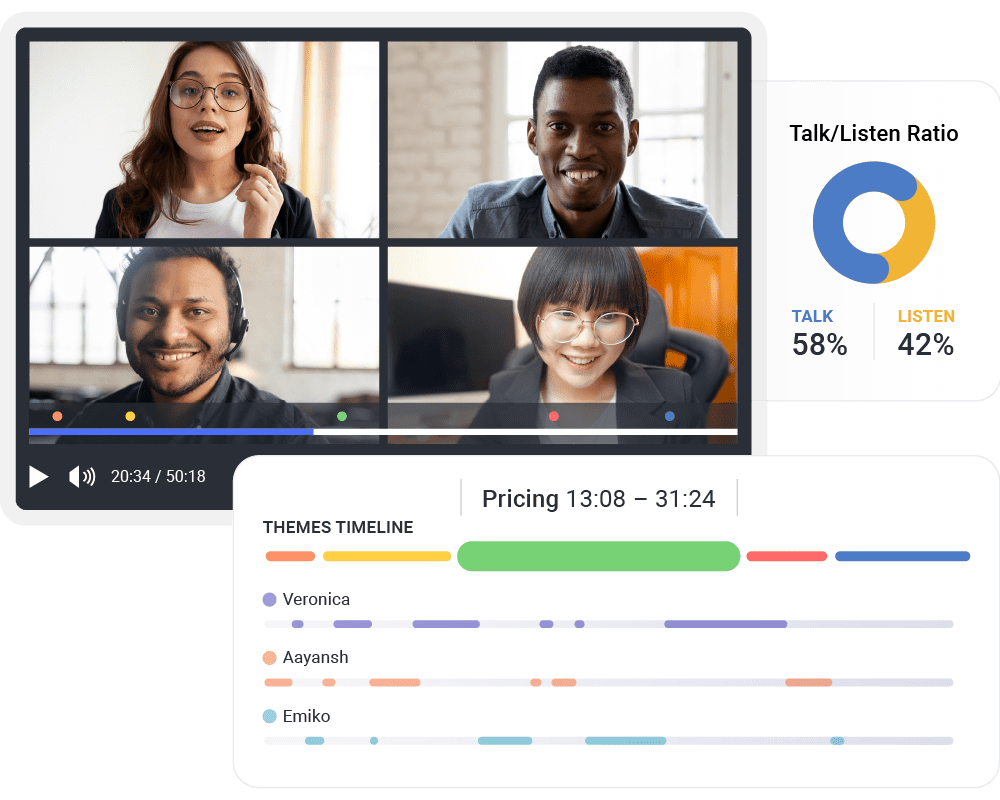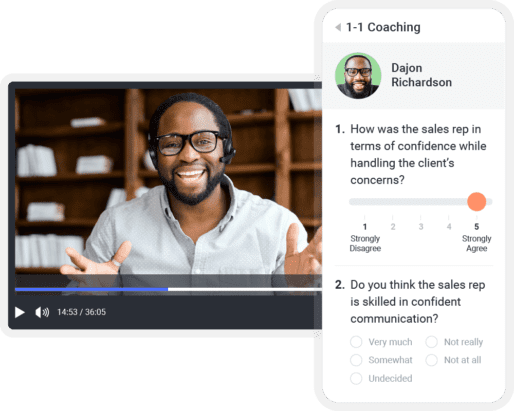AI Isn’t Replacing Sales People — It’s Making Them Better
One of the most frequently searched questions about AI in sales is, “Will AI replace salespeople?” The fear of this is driven by attention-grabbing headlines like this one from Forbes: Why Artificial Intelligence Will Eliminate Millions of Sales Jobs. With articles like that, it’s no surprise some reps worry that AI and automation will eliminate their jobs and view technology as a competitor. Those reps are, subsequently, often resistant to adopting tools that help them and make their lives easier.
But AI for sales teams can become an enabler and collaborator rather than a competitor. AI isn’t replacing salespeople; it’s helping optimize performance, improve close rates, and excel in their work.
AI in sales streamlines lead prioritization
Using AI for lead prioritization saves your reps time and helps them work more efficiently. AI tools automate and streamline lead scoring and prioritization, based on how likely prospects are to convert into customers. It analyzes multiple data sets including your sales team’s existing interactions with the prospect. Then it compares the lead against the profile of similar companies in your database, to prioritize the best-fit leads for your sales team.
Without AI, sales reps would need to do a lot of that analysis themselves, or prioritize leads based on guesswork and their gut instinct. But if you use AI to handle lead prioritization, your sellers have more time to spend on core selling activities.
Instead of needing to comb through your CRM, reps can now focus on building their knowledge around competitor products and handling objections, or practicing product demos and pitches. Sellers can prioritize readiness activities to ensure they’re fully prepared for their next customer call.
Additionally, reps can focus more of their time on qualified leads rather than chasing the wrong opportunities. This makes it more likely that they’ll book their target number of meetings or hit quota, as they’re spending more time with engaged prospects.
AI in sales analyzes customer conversations
Sales teams can use AI tools to record, transcribe, and analyze customer calls and other sales interactions. Tools like Mindtickle’s conversation intelligence solution analyze customer conversations to identify the main topics and themes discussed. You can also track specific keywords, such as competitor names, product names, or common challenges.

This data categorizes the prospect’s pain points and desired outcomes. With this information, sales reps can better tailor their follow-up messages and identify the next best actions to nurture their leads without having to listen back to their call recordings.
Similarly, AI can help identify prospects who are a good fit for upsell or cross-sell conversations by detecting cues in their conversations, such as mentions of other products or use cases. By flagging any product names or competitors that prospects refer to on their sales calls, reps can spot when prospects are looking for other solutions or features and can explore that in future conversations.
AI analyzes rep behavior to personalize coaching
AI tools can help sales managers get real-time insights into rep performance during customer interactions. Mindtickle’s Call AI provides call scores after each sales activity and identifies the strengths and weaknesses demonstrated by the rep on that call.

Based on the rep’s score and behavior on the call, it prescribes practice exercises and training activities for the rep to complete such as practice demos and virtual role-plays. Call AI then analyzes and scores the completed training exercises, which managers can also review to offer further coaching where required.
“A manager will use the coaching template in Mindtickle to review a team member’s performance,” explained Tovi Dana, knowledge and learning director at Elmo Motion Control. “This provides a framework for their discussion afterward and makes it easy to track how much the rep is improving with these structured coaching sessions.”
AI-assisted coaching makes personalized sales training possible at scale. Leveraging AI to monitor rep behavior and personalize training accordingly means reps are able to make bigger improvements in a shorter time. Instead of running through one-size-fits-all training exercises, they can focus on the specific areas they need to work on — such as cold outreach, closing deals, or handling objections.
AI improves close rates across the sales org
With an AI tool like Mindtickle’s Call AI, more salespeople make or exceed quota than before the company started using it to monitor their sales performance. For example, Turing Video saw a 200% increase in quota attainment year-on-year after implementing Call AI.
Greg Myers, regional VP of sales at Turing Video, explained, “The recordings and transcripts provided by Call AI are a prime piece of business intelligence for me. This allows me to coach my team to more wins and emphasize what’s working for us.”
Call AI creates a continuous cycle of performance analysis, skills development, coaching, assessment, and improvement. It gives sales leaders actionable insights into why deals are won or lost so they can make changes to their process and better set sellers up for success. As a result, your reps are more likely to win deals when they come up against your competitors because they can better prepare for high-value sales calls.
AI helps set your sales team up for success
AI isn’t going to replace your salespeople because the human touch is essential to building long-lasting customer relationships. If anything, sales is one of the business functions most unlikely to be replaced by AI because that human connection is so important. Just think of how quickly people hang up on an automated robocall compared with when they’re speaking to another person.
While AI isn’t replacing salespeople, sales organizations are increasingly finding new use cases for AI, machine learning, and automation. AI helps sales teams improve their processes and engage more quickly with their prospects, fully equipped with the relevant information to move sales conversations forward.
Ready to add artificial intelligence into your sales team’s toolkit? Check out our Buyer’s Guide to Conversation Intelligence Solutions.


